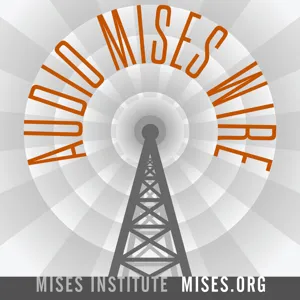Podcast Summary
Facts and Values: J.W. Rich argues that there's a less pronounced gap between factual and value judgments than commonly assumed, and that one can derive normative statements from empirical ones.
J.W. Rich's book on praxeological ethics challenges the traditional view that there is a fundamental and total difference between factual and value judgments. According to Rich, the gap between the two is less than commonly assumed. He argues that there is no categorical difference between factual "is" statements and value "ought" statements, and that one can derive normative statements from empirical ones. This perspective goes against the grain of the value-free science of human action, praxeology, but Rich maintains that the distinction between the two types of statements is not as clear-cut as it seems. This perspective opens up new possibilities for understanding the relationship between facts and values and the nature of ethics. However, it is important to note that this is a complex and nuanced argument, and there are still many questions to be explored and debated.
Facts vs Moral Judgments: Transforming 'is' statements into 'ought' statements requires identifying desired ends and effective means. Facts and moral judgments are distinct, and private solutions can address societal needs.
Transforming an "is" statement into an "ought" statement requires identifying the desired end and finding effective means to achieve it. This concept was discussed in relation to Rich's argument that moral statements, such as "murder is wrong," cannot be derived solely from factual statements about consequences. Instead, they represent distinct moral judgments. Furthermore, Rich's argument that certain societal functions can only be provided by the state was challenged, as examples like turnpike organizations in the 18th and 19th centuries demonstrated that private actors could finance and construct roads. This discussion highlights the importance of understanding the distinction between facts and moral judgments, as well as the potential for private solutions to societal needs.
Economic calculation problem: The economic calculation problem arises when the state, due to its lack of profit or loss mechanism, struggles to determine the sufficient quantity of a public good to be supplied
The argument for the state's necessity in producing public goods is not as straightforward as it may seem. Rich, in the discussion, delves deeper and challenges the assumption that the free market cannot provide sufficient quantities of public goods. He highlights the economic calculation problem, which arises due to the state's inability to utilize profit or loss. This issue makes it difficult to determine the sufficient quantity of a good to be supplied in the absence of market mechanisms. Those advocating for state intervention may argue that the state is essential for national defense, but Rich counters this with an historical example of private action effectively repelling an invasion. During Worldtime: The Second World War, the Slavic peoples' intense guerrilla fighting forced Nazi Germany to withdraw from Yugoslavia without external help. Additionally, Rich contrasts the attitudes of the state and free market actors towards punishment, highlighting that while free market actors aim to reverse the effects of crime, the state primarily focuses on the criminal. Overall, the discussion sheds light on the complexities of public goods provision and the role of the state.
